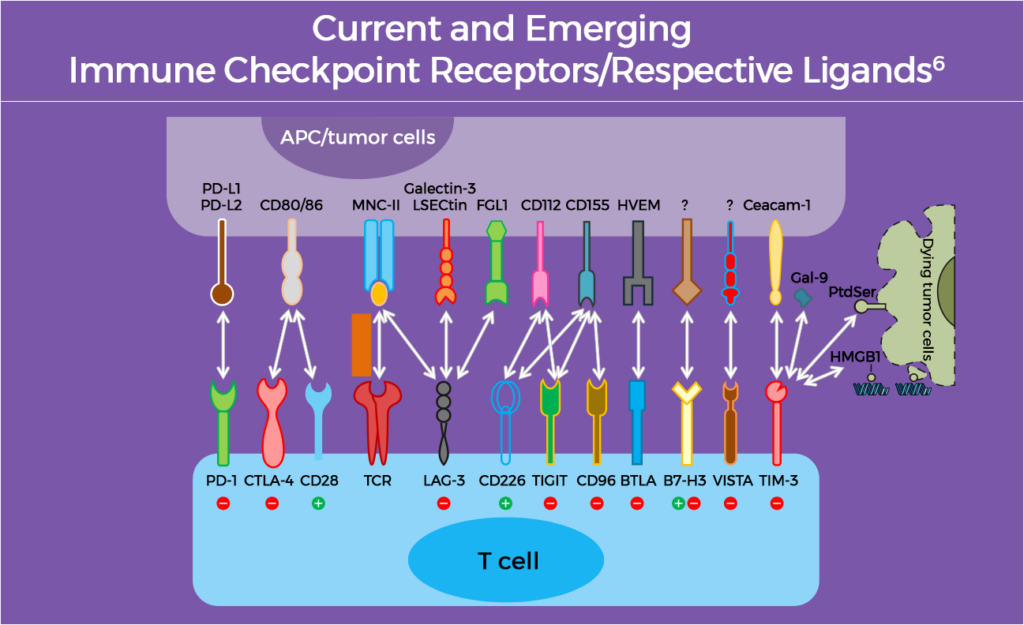Immune System as a Treatment Target
Immune System as a Treatment Target
The immune system has become a target for cancer treatments in recent years.1 The body’s immune system can detect and destroy abnormal cells and most likely prevent or slow the growth of many cancers.1 However, cancer cells can avoid destruction by the immune system.1 Immunotherapy has emerged as a type of cancer treatment that helps the immune system fight cancer.1 There are several types of immunotherapy, including immune checkpoint inhibitors, chimeric antigen receptor (CAR) T-cell therapy, monoclonal antibodies, vaccines and immune system modulators.2
Immune Checkpoint Inhibition
Immune checkpoint inhibitors block checkpoint proteins, which allows immune cells to exhibit a stronger response to cancer.1-4 Immune checkpoint inhibitors are approved by the U.S. Food and Drug Administration (FDA) for intravenous infusion to treat patients with various cancers, including breast cancer, cervical cancer, colon cancer, head and neck cancer, Hodgkin lymphoma, liver cancer, lung cancer, skin cancer, and other solid tumors.3 Drugs that target different checkpoint proteins are currently used to treat different types of cancer.4
CTLA-4
CTLA-4 is a checkpoint protein on T cells that prevents the “off” signal from being sent and allows the T cells to kill cancer cells.1,4 CTLA-4 inhibitors include ipilimumab (Yervoy), the first immune checkpoint inhibitor approved by the FDA, and tremelimumab (Imjudo).4 These drugs are used to treat advanced melanoma and other cancers, in combination with a PD-1 or PD-L1 inhibitor.4,5
PD-1 and PD-L1
PD-1 is another checkpoint protein on T cells.4,5 When PD-1 attaches to PD-L1, a protein on normal and cancer cells, it instructs the T cell to leave the other cells alone.4,5 Therapies that target PD-1 or PD-L1 can block this binding and boost immune response.4 PD-1 inhibitors include pembrolizumab (Keytruda), nivolumab (Opdivo), cemiplimab (Libtayo), and dostarlimab (Jemperli) which are used to treat cancers of the bladder, breast, head and neck, Hodgkin lymphoma, melanoma and non-melanoma skin cancers, and non-small cell lung cancer.4,5 Atezolizumab (Tecentriq), avelumab (Bavencio) and durvalumab (Imfinzi) are PD-L1 inhibitors used to treat cancers including bladder cancer, breast cancer, Merkel cell carcinoma and non-small cell lung cancer.4,5
Emerging Tumor Targets
Research continues to focus on other checkpoint proteins and developing drugs that can be used to target them.5-8 A selection of new immune checkpoint targets includes:
- LAG-3—works synergistically with PD-1 to induce immune suppression.9-11 Targeted combination therapy may help overcome immune evasion.9-11 A LAG-3 inhibitor is approved for advanced melanoma.10 This target is also being evaluated for lung, colorectal, liver, and esophageal or gastric cancers, multiple myeloma and chordoma.11
- MUC16—has been shown to modulate the innate immune response against ovarian cancer cells.12 Although MUC16 has a protective role in normal physiology, it is also overexpressed in various cancers, with an important role in tumorigenicity, disease progression and acquired resistance to therapy.12
- TLR-9—a known inducer of interferon production.13 TLR-9 is being looked at for melanoma, non-small cell lung cancer, breast cancer, and sarcoma.13
- CD20/CD3—simultaneous binding of CD20, a B-cell surface antigen, and CD3, a T-cell activator, has demonstrated promising clinical activity against B-cell lymphoma.14 Several CD20 x CD3 bispecific antibodies have shown excellent efficacy for treatment of relapsed/refractory non-Hodgkin’s lymphoma including glofitamab (Columvi), epcoritamab (Epkinly), odronextamab (Ordspono), and mosunetuzumab (Lunsumio)15
- BCMA—a specific and highly expressed antigen on myeloma cells is being looked at as a promising target for therapies for multiple myeloma.15 BCMA x CD3-targeted bispecific antibodies for relapsed/refractory multiple myeloma include teclistamab (Tecvayli), elranatamab (Elrexfio), and linvoseltamab. In addition, a BCMA-targeted antibody-drug conjugate, belantamab mafodotin (Blenrep), is also active in multiple myeloma.17
- VISTA—an immunoregulatory molecule involving in maintaining T-cell and myeloid quiescence, is being investigated as a target for therapies for melanoma, renal cell carcinoma, prostate, non-small cell lung, acute myeloid leukemia, colorectal, ovarian and endometrial cancers.16
References
- National Cancer Institute. Immunotherapy to Treat Cancer. Updated September 24, 2019. https://www.cancer.gov/about-cancer/treatment/types/immunotherapy
- Cleveland Clinic. Immunotherapy. Last reviewed November 15, 2022. https://my.clevelandclinic.org/health/treatments/11582-immunotherapy
- National Cancer Institute. Immune Checkpoint Inhibitors. Reviewed April 7, 2022. https://www.cancer.gov/about-cancer/treatment/types/immunotherapy/checkpoint-inhibitors
- American Cancer Society. Immune Checkpoint Inhibitors and Their Side Effects. Last Revised: December 27, 2024. https://www.cancer.org/treatment/treatments-and-side-effects/treatment-types/immunotherapy/immune-checkpoint-inhibitors.html
- The University of Texas MD Anderson Cancer Center. Immune Checkpoint Inhibitors. https://www.mdanderson.org/treatment-options/immune-checkpoint-inhibitors.html
- Qin S, Xu L, Yi M, Yu S, Wu K, Luo S. Novel immune checkpoint targets: moving beyond PD-1 and CTLA‑4. Mol Cancer. 2019;18:155.
- Licciulli S. American Association for Cancer Research. Experts Forecast Cancer Research and Treatment Advances in 2023. Cancer Research Catalyst. January 13, 2023. https://www.aacr.org/blog/2023/01/13/experts-forecast-cancer-research-and-treatment-advances-in-2023/
- Cancer Research Institute. Immunotherapy: Immunomodulators: Checkpoint Inhibitors, Cytokines, Agonists and Adjuvants. https://www.cancerresearch.org/treatment-types/immunomodulators
- Carter D. The University of Texas MD Anderson Cancer Center. LAG-3 Inhibitors: A New type of Immunotherapy. November 30, 2022. https://www.mdanderson.org/cancerwise/lag-3-inhibitors–a-new-type-of-immunotherapy.h00-159544479.html
- U.S. Food & Drug Administration. FDA Approves Opdualag for Unresectable or metastatic melanoma. March 18, 2022. https://www.fda.gov/drugs/resources-information-approved-drugs/fda-approves-opdualag-unresectable-or-metastatic-melanoma
- Winstead E. National Cancer Institute. Opdualag Becomes First FDA-Approved Immunotherapy to Target LAG-3. Cancer Currents Blog. April 6, 2022. https://www.cancer.gov/news-events/cancer-currents-blog/2022/fda-opdualag-melanoma-lag-3
- Aithal A, Rauth S, Kshirsagar P, et al. MUC16 as a novel target for cancer therapy. Expert Opin Ther Targets. 2018;22:675-686.
- Karapetyan L, Luke JJ, Devar D. Toll-like receptor 9 agonists in Cancer. Onco Targets Ther. 2020;13:10039-10060.
- CD20/CD3 Bispecific Antibodies Can Revolutionize B-Cell Lymphoma Therapy. Target Ther Oncol. 2022;11:95,101-102.
- Carlo-Stella C. CD3×CD20 bispecifics + chemotherapy: Good news for R/R DLBCL. Blood. 2025;145:1591-1592.
- Kleber M, Ntanasis-Stathopoulos I, Terpos E. BCMA in Multiple Myeloma-A Promising Key to Therapy. J Clin Med. 2021;10:4088.
- Devasia AJ, Chari A, Lancman G. Bispecific antibodies in the treatment of multiple myeloma. Blood Cancer J. 2024;14:158.
- VISTA Emerges as a Promising Immunotherapy Target in Cancer. Target Ther Oncol. 2022;11:81,87-88.
ALL URLs accessed October 28, 2025


